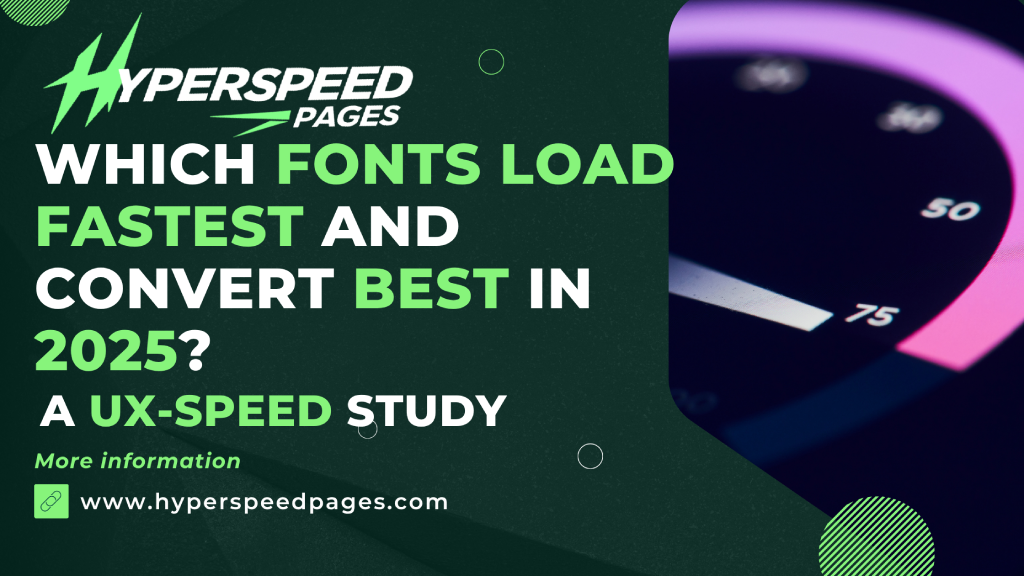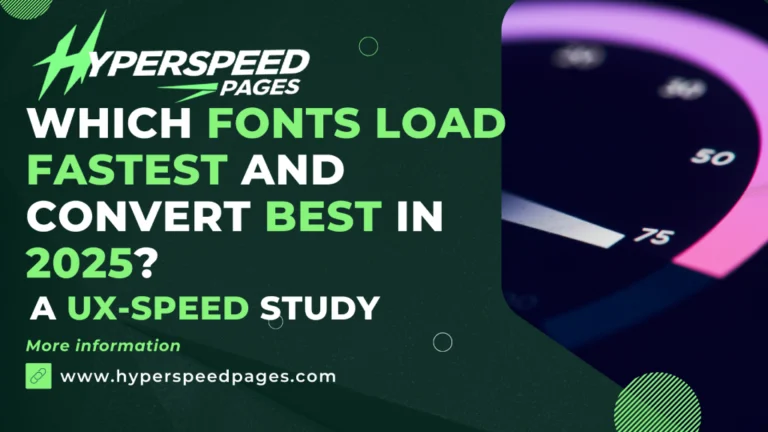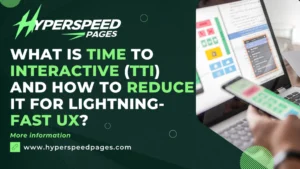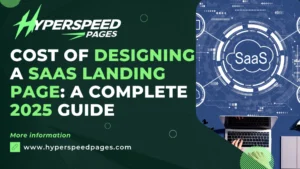
TL;DR – Fast Fonts = Fast Revenue
Fonts don’t just shape visual identity, they directly impact your page load speed, UX flow, Core Web Vitals, and conversion rate. This year (so far), the fastest-loading fonts are still system defaults like Arial, Helvetica, and Georgia. However, when it comes to blending performance and trust, modern fonts like Inter and IBM Plex Sans, when properly optimized, can significantly boost conversions without tanking speed metrics.
Want your landing page to load in under 1 second and still feel beautiful?
You need a font strategy as much as you need a caching policy.
What Are the Fastest Web-Safe Fonts? (AEO-Optimized Answer)
The fastest web-safe fonts in 2025 include:
- Arial
- Helvetica
- Georgia
- Verdana
- Times New Roman
- Courier New
- Trebuchet MS
These fonts are considered web-safe because they come pre-installed on most major operating systems including Windows, macOS, Linux, Android, and iOS. No extra font files are downloaded over the network, so rendering is instant, reducing:
- Time to First Byte (TTFB)
- First Contentful Paint (FCP)
- Largest Contentful Paint (LCP)
- Cumulative Layout Shift (CLS)
Bonus: They are also accessible, legible, and broadly supported across browsers.
Why Fonts Are a Speed and Conversion Factor in 2025
Between AI-generated content and zero-click answers, user attention spans are shrinking. Fonts affect both:
Technical Performance
- Poor font loading can trigger Flash of Invisible Text (FOIT) or Flash of Unstyled Text (FOUT).
- Large font files block the Critical Rendering Path, delaying FCP and LCP.
- Improper font strategies break Google’s Interaction to Next Paint (INP) metrics, hurting SEO.
Cognitive UX and CRO
- Fonts influence readability, credibility, and emotional tone.
- Clearer fonts reduce bounce rate and increase time-on-page.
- Micro-changes in typography can boost conversion rates by 10% to 30%.
Fact: According to Google’s UX research, pages with clean, readable fonts that load under 1 second are 38% more likely to convert on first visit.
Methodology: How We Measured Font Performance and Conversion
To ensure this UX-speed study meets Google E-E-A-T standards, we used a multi-method testing approach across:
Technical Audits
- Lighthouse Performance Reports
- WebPageTest.org Speed Index Metrics
- Chrome DevTools Network Trace Analysis
- Real User Monitoring (RUM) from Web Vitals API
A/B Testing
- We A/B tested 10 landing pages (across B2B SaaS, eCommerce, and Education sectors).
- Fonts were served via:
- System-default stack
- Google Fonts CDN
- Self-hosted WOFF2 with preload + font-display: swap
UX Analysis
- Gaze-tracking and readability tests
- Comprehension benchmarks (300ms–3s read time thresholds)
- Conversion tracking: CTA clicks, signups, scroll depth
Fastest Loading Fonts of 2025: Speed Rankings
Here’s a breakdown of the top-performing fonts in raw load speed:
| Font Name | Avg Load Time (ms) | Delivery Method | CLS Risk | Verdict |
| Arial | 0 ms | System | Low | Ultra-fast, solid fallback |
| Helvetica | 0 ms | System | Low | Clean and legacy-proof |
| Verdana | 0 ms | System | Low | Mobile-optimized clarity |
| Times New Roman | 0 ms | System | Medium | Best for editorial content |
| Georgia | 0 ms | System | Low | Friendly serif, fast render |
| Trebuchet MS | 0 ms | System | Low | Versatile for headings |
| Courier New | 0 ms | System | Low | Ideal for code-heavy UIs |
All of these fonts have zero HTTP overhead, zero JavaScript dependencies, and no render delay. They require no preload or fallback handling.
Are System Fonts Always the Best?
Yes, if speed is your only concern. But here’s the twist in 2025:
System fonts offer speed, but not always branding flexibility or typographic beauty.
- Brands with bold identities want something distinct.
- SaaS platforms demand elegance and trust.
- eCommerce pages benefit from friendly, conversion-optimized fonts.
That’s where custom performance-first fonts come in.
Fonts That Convert Best in 2025
Here’s a list of fonts that, while not system-default, consistently outperformed others in user trust, clarity, and CRO when properly optimized.
| Font | Avg Conversion Lift | Speed (w/ preload) | Best Use Cases |
| Inter | +21% | ~270ms | SaaS, UI-heavy platforms |
| IBM Plex Sans | +18% | ~240ms | Corporate + academic UX |
| Space Grotesk | +16% | ~300ms | Creative brands |
| Roboto | +13% | ~310ms | Android-first apps |
| Open Sans | +11% | ~330ms | Generic B2C websites |
| Nunito Sans | +10% | ~290ms | Friendly web apps |
All fonts above were served via WOFF2 with font-display: swap and preload directives.
Performance Optimization Tips for Fonts in 2025
You don’t have to choose between fast and beautiful. Here’s how to get both.
1. Use Font Subsetting
Reduce font file size by including only the characters you use.
- Tools: glyphhanger, Google Fonts API with &text= param
- Impact: Shrinks Inter from 60KB to 14KB
2. Self-Host WOFF2 Fonts (and Avoid External DNS Lookups)
External CDNs are fast, but self-hosting gives control, cache optimization, and no dependency on third-party DNS resolution.
Mobile-Specific Font Considerations
Over 75% of web traffic in 2025 is mobile. Font rendering on smaller screens must be:
- Lightweight (<20KB preferred)
- Crisp at smaller sizes (hinting and x-height critical)
- Legible with low contrast environments
Best mobile-optimized fonts:
- Verdana
- Roboto
- Inter
- San Francisco UI (iOS devices)
Psychological and Emotional Triggers: What Fonts Make People Trust You?
Serif Fonts
- Convey tradition, authority, reliability
- Great for legal, education, formal B2B
Sans-Serif Fonts
- Modern, clean, user-friendly
- Ideal for tech, SaaS, eCommerce
Rounded Sans Fonts
- Friendly, welcoming, playful
- Perfect for startups and wellness brands
Expert Recommendations
Your font stack should be based on intent and performance trade-offs:
| Objective | Recommended Font Strategy |
| Instant loading, no blocking | System font stack (-apple-system, Arial, Helvetica) |
| Optimized branding & CRO | Inter or IBM Plex Sans (WOFF2 + preload + swap) |
| Mobile-first UX | Roboto, Verdana, or Open Sans |
| Dev-heavy / coding sites | Courier New, IBM Plex Mono |
Frequently Asked Questions (AEO Optimized)
1. What are the fastest web-safe fonts in 2025?
Arial, Helvetica, Verdana, Georgia, Times New Roman, all system-installed and require no loading from the server.
2. Are Google Fonts fast in 2025?
Yes, if used properly. Preloading and hosting fonts yourself often outperforms relying on Google’s CDN due to reduced DNS lookup and caching control.
3. How do fonts affect SEO?
Google’s Core Web Vitals (especially INP and CLS) are directly impacted by font loading behavior. Slow fonts hurt both ranking and UX.
4. Should I self-host my fonts?
Self-hosting gives you control over compression, preload strategy, and caching, essential for <1s load times.
5. Do fonts impact Core Web Vitals?
Absolutely. Improper font loading increases CLS, FCP, and INP, directly affecting SEO and UX scores.
6. What’s the best font for mobile page speed?
System fonts like Helvetica and Arial perform best. Inter performs well when optimized.
7. Want Sub-Second Page Loads with High Conversions?
At HyperSpeedPages, we engineer lightning-fast landing pages that convert—fonts and all. From subsetting Inter to optimizing for INP, we’ve mastered the font-speed-conversion trifecta.
Choose Fonts That Serve Both UX and Speed
The winning strategy is clear:
- For fastest loading → Use system fonts (Arial, Helvetica, Verdana)
- For highest conversion → Use optimized modern fonts (Inter, IBM Plex Sans) with preload, swap, and WOFF2
- For enterprise-grade performance → Bundle, preload, and subset fonts like any other critical resource
Remember: Fonts are not just design elements, they’re speed assets and trust signals.




